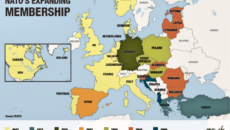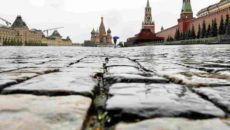The arrest warrant that the International Criminal Court in The Hague issued for Colonel Gaddafi, his son Saif and his brother-in-law Senussi is the logical outcome of the military action launched against him, led by the U.S., France and Great Britain. If it was necessary at that time to rush to the aid of the civilian population, it’s natural to presume today that Gaddafi has committed “crimes against humanity”. Nevertheless, this decision was late in coming: after 100 days of war, but even more importantly, after 43 years of ruthless dictatorship, which has recently been too soon forgotten by the very people hunting him down.
The warrant deprives Gaddafi of the chance to take part in any peace negotiations and virtually puts a legal stamp of approval on his removal from power. Now the practical aspect remains: winning the war and ousting him or, as rumor has it, getting rid of him with targeted bombings or land attacks by special commando forces.
However, despite The Hague’s decision there are doubts regarding the legitimacy of the international mission and how it’s being carried out. Why wage war against Gaddafi but not against Syria’s Assad? Why wage war against Gaddafi now, after 40 years of ruthless dictatorship? And how is the war going? Why doesn’t Gaddafi seem to be defeated yet?
These questions aren’t only ours, nor do they come from isolated fringe groups of pacifists. Quite the opposite. Here’s a super-official, super-professional example: the report entitled Libye: un avenir incertain (Libya: An Uncertain Future) prepared by the Centre international de recherche et d’études sur le terrorisme directed by Eric Denécé.
Released on May 30, 2011, the report had excellent contributors: Saida Benhabyles (Algeria, former Minister of National Solidarity), Roumiana Ougartchinska (France, investigative journalist), Yves Bonnet (France, former Prefect, former Member of Parliament and, most importantly, former Director of DST counterintelligence), Dirk Borgers (Belgium, expert in North Africa), Eric Denécé and André Le Maignen (France, Vice President of the Centre). Let’s bear in mind that this report was addressed to President Sarkozy, that is, the man who wanted the war against Gaddafi more than anyone else did. But the writers, who have worked in the field, say there are lots of good reasons to be doubtful.
The characteristics of the uprising (Page 7): “The Libyan revolution is neither democratic nor spontaneous … The Libyan movement cannot be compared to the popular uprisings in Tunisia and Egypt … Western intervention would cause more problems than it would resolve … The coalition might manage to bring down the Libyan regime. But the West must be careful that it is not replaced by an even more radical and just as autocratic regime.”
Regarding Gaddafi’s notorious “mercenaries” (Page 14): “Many things have been written about the ‘mercenaries’ enrolled in the Libyan security forces, but few of them are accurate … The information coming in from the rebel forces who are reporting on these foreign players is vague and must be taken with a grain of salt … The actual number of foreign combatants is difficult to determine. The figures being heard are inflated (up to 6,000 according to some sources) and they seem to deliberately confuse Libyans of foreign origins and volunteers who’ve come in from other countries.”
The media’s role in creating the casus belli (Page 16): “The same mistake was deliberately made when the Arab and Western media stated that the regime fired on its people. Our mission visited the location and found nothing of the sort. And yet the Al Jazeera troupe is present in Tripoli. Its reporters, often Westerners, work without hindrance from the regime. The consequence of this disinformation is clear: the UN resolution was voted on based on information of this sort and without any board of inquiry having gone to the location in advance. It is not an exaggeration to say that Al Jazeera created the event and influenced the U.N. The media war around Libya is a painful reminder of what happened in the Balkans starting in 1991 at Serbia’s expense.”
And so on and so forth for 45 long pages. Does this mean the war against Gaddafi is all a deception? Of course not. But if there’s one thing that wars teach us, it’s that everyone lies: us and them, the good guys and the bad guys. In these situations, something is definitely deceitful: foregone conclusions.




Very nice, i suggest webmaster can set up a forum, so that we can talk and communicate.
Thanks for the share!
Nancy.R
Gaddafi: From Tyrant to Outlaw, But Doubts Remain | Fulvio Scaglione – Giornalista – Gaddafi: From Tyrant to Outlaw, But Doubts Remain | Fulvio Scaglione – Giornalista.
Great tips! I will try to use them. Thanks for any future updates.